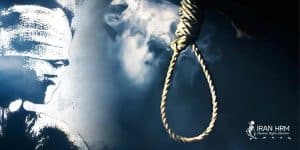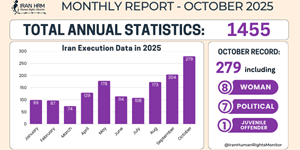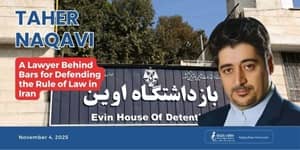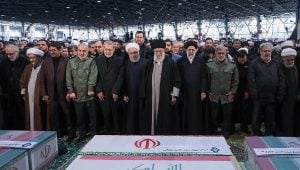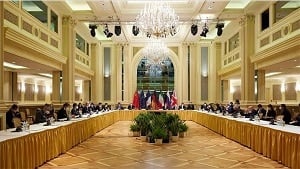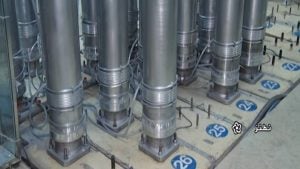Facebook
Twitter
LinkedIn
Pinterest
Reddit
Email
Print
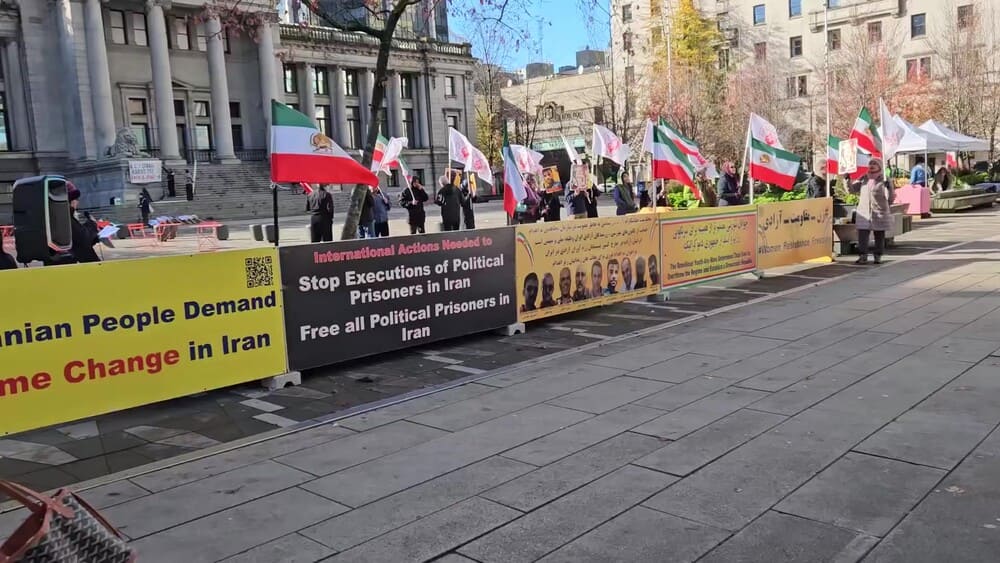
THIS PAGE WILL BE UPDATED WITH THE LATEST NEWS
UPDATE: 07:30 AM CET
Pressure On Iran Is Key to Peace in Middle East, Says Top US Sanctions Official
The Middle East has a real opportunity for peace if it increases pressure on the “head of the beast” in Iran, according to a US Treasury official overseeing sanctions.
John Hurley, the undersecretary for terrorism and financial intelligence, said Iran was at the centre of instability in the region, describing it as a “beast with many arms”.
“The head of the beast is in Tehran,” Mr Hurley said, and its arms were its regional proxies, “who’ve also been contributing to instability and to terror”.
Kobra Rezaei Executed along with Four Others in Yazd Prison
At dawn on Tuesday, November 4, 2025, Kobra Rezaei was hanged in Yazd Prison as part of a group execution involving five prisoners. The charge against her was reportedly related to drug offenses.
As of the time of this report, news of Kobra Rezaei’s execution has not been published by any state-run media outlets or judiciary-affiliated sources of the Iranian regime.
With the execution of Kobra Rezaei in Yazd Prison, the number of women executed in Iran since the beginning of 2025 has reached 48, marking an unprecedented record in the execution of women in Iran. In the entire 2024, 34 women were executed across the country.
Vancouver Rally by MEK Supporters Condemns Iran Executions, Urges Support for Political Prisoners
Vancouver, Canada – November 1, 2025 – Supporters of the People’s Mojahedin Organization of Iran (PMOI/MEK) held a rally to protest the Iranian regime’s escalating use of the death penalty, particularly against political prisoners.
Toronto Rally by MEK Supporters Condemns Iran Executions, Urges Support for Political Prisoners
Toronto, Canada – November 1, 2025 – Supporters of the People’s Mojahedin Organization of Iran (PMOI/MEK) held a rally to protest the Iranian regime’s escalating use of the death penalty, particularly against political prisoners.
Iran Human Rights Monthly Report — October 2025
October 2025 saw an unprecedented escalation in executions across Iran, alongside intensified pressure on political prisoners, systemic medical neglect, and nationwide prison protests against the death penalty. Documented executions reached at least 279 for the month of October—an historic monthly high in recent decades—bringing the recorded total to 1,455 in the first ten months of 2025. The month included executions of 8 women and juvenile offenders, public hangings, and seven political prisoners executed on 4 October in Ahvaz and Karaj. Families of death-row prisoners repeatedly protested in Tehran, while about 1,500 death-row prisoners in Qezel Hesar Prison undertook a multi-day hunger strike demanding an end to executions. Mass and serial executions occurred in clusters across multiple prisons (e.g., Qezel Hesar, Shiraz, Isfahan, Mashhad, Kerman, Qom, Rasht, Zanjan), with single-day tallies repeatedly reaching double digits (e.g., 24 executed on 15 Oct; 18 on 8 Oct; 15 on 22 Oct).
Taher Naqavi: A Lawyer Behind Bars for Defending the Rule of Law in Iran
On 27 October 2025, imprisoned lawyer Taher Naqavi and several other political prisoners in Evin Prison began a hunger strike. According to sources close to Naqavi, the decision came after months of severe pain, denial of medical care, and the indifference of prison authorities. One cellmate recalled: “He said he could no longer bear the injustice. His strike wasn’t only for himself; it was to remind everyone that even inside prison, the law must mean something.” Naqavi, a Tehran Bar Association lawyer and human rights defender, had dedicated his career to upholding the law—until that same law turned against him. Taher Naqavi was arrested on 6 February 2024 when security forces raided his office in Tehran, where he represented families of victims from the 2022 nationwide protests. Like many other independent lawyers, he was charged with the vague and overused accusations of “propaganda against the state” and “collusion against national security.”
Khamenei Reaffirms Confrontational Stance Toward the U.S. on November 2 Address
On November 2, 2025, Iranian Supreme Leader Ali Khamenei delivered a speech before a group of students and Basij members on the occasion of the anniversary of November 4, known in Iran as the “National Day of Fighting Global Arrogance.” During the meeting, Khamenei described relations between Iran and the United States as “inherently confrontational” and made any future cooperation conditional upon the U.S. withdrawal of military bases from the region, an end to what he called “foreign interference,” and the cessation of support for Israel. Khamenei referred to the 1979 takeover of the U.S. Embassy in Tehran as a “historic and identity-forming act,” claiming that the event “exposed the true nature of the U.S. government.” He also cited the 1953 coup d’état in Iran as evidence of America’s long-standing hostility, saying that “enmity with the United States has deep roots.”
Conflicting Statements by Iranian Regime Officials About Negotiations with the United States
Esmail Baghaei, spokesperson for the Iranian regime’s Ministry of Foreign Affairs, denied reports of message exchanges from Washington to Tehran through Oman and the beginning of a negotiation process, taking a position completely different from that of the spokesperson for President Masoud Pezeshkian’s government. On Monday, November 3, Baghaei stated in a press conference that some remarks on the matter were inaccurate and that during the visit of Majid Takht-Ravanchi, the regime’s deputy foreign minister for political affairs, to Muscat, no official message from Washington was delivered to Tehran.
Iran’s Nuclear Drive: Political Survival, Not Economic Progress
From its inception, Iran’s nuclear program — as framed by regime decision-makers — was never merely a scientific or industrial undertaking. Rather, it emerged as a perceived existential necessity for the survival of the political order. A content analysis of the program’s origins suggests that, after the end of the eight-year Iran–Iraq war and the acceptance of a ceasefire, senior figures concluded that nuclear capabilities were essential to guarantee the regime’s continuity and sustain its strategy of state-sponsored coercion and deterrence. This logic, policymakers argued, reflected a hard-headed reading of global power dynamics: without nuclear deterrence, the regime believed it could not secure its standing in a world organized around military and strategic influence.
Also, read Iran News in Brief – November 4, 2025

